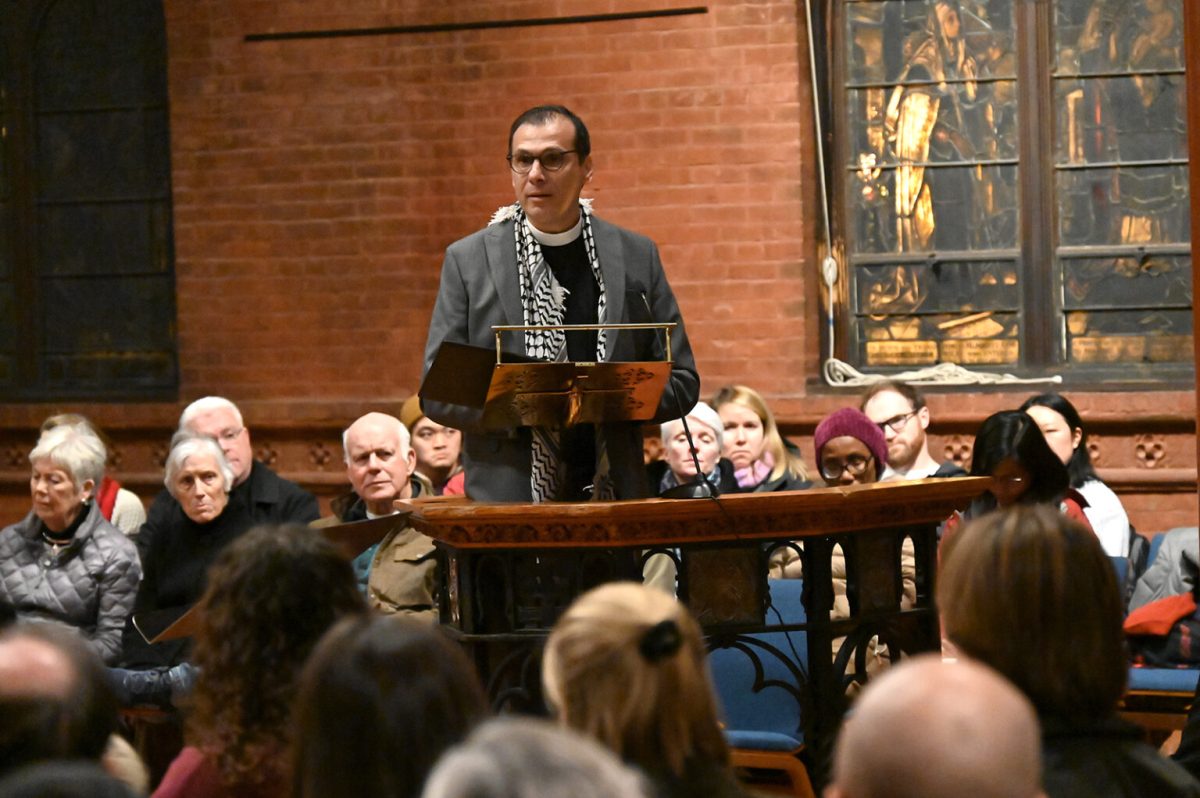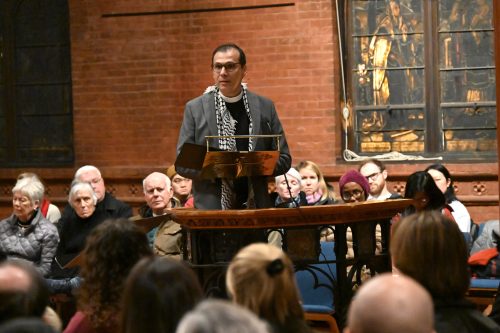
(RNS) — A year ago, the Rev. Munther Isaac, pastor of Christmas Evangelical Lutheran Church in Bethlehem in the occupied West Bank, joined other Christian leaders in abruptly canceling Christmas celebrations in the city where the Bible says Jesus was born. It was a bold protest against Israel’s ground assault in Gaza Strip in response to the Hamas-led attack two months prior that killed 1,200 Israelis and resulted in hundreds more being taken hostage.
At the time, Isaac had already emerged as a dynamic figure among Christians sympathetic to the Palestinian cause. In November 2023 he traveled to the U.S. with a delegation of pastors from Bethlehem, bringing a letter urging President Joe Biden and other lawmakers to embrace a cease-fire. He went on to speak at vigils in Washington and preached at the renowned Riverside Church in New York City. Last Christmas his own church built a nativity scene depicting the Baby Jesus atop stone debris evoking the destruction in Gaza, calling it “Christ in the Rubble.”

The Rev. Munther Isaac, pastor of Bethlehem’s Christmas Lutheran Church, addresses a vigil at St. Mark’s Episcopal Church in Washington, Tuesday, Nov. 28, 2023. (RNS photo/Jack Jenkins)
A year later, Christmas celebrations in Bethlehem were muted, which Isaac said would further drain a local economy that relies on profits from seasonal tourism. The repeat protest, he said, is a grim assessment of how little the past year’s pro-Palestinian activism has achieved: Despite protests, dramatic legal moves by the United Nations, and reports from local health authorities that more than 45,000 Palestinians have been killed, the Israel-Hamas war grinds on.
Isaac outlined his thoughts on the past year in a lengthy interview with RNS, reflecting on his advocacy, the response from Christians, and his concerns about the incoming Trump administration. “If I listen to myself and what I was saying 12 months ago, last Christmas, we’re repeating the same thing,” Isaac said. “We’re calling for a cease-fire, which seems like we’re calling for the world to humanize the people of Palestine.”
Isaac said his community is also racked with anxiety over the to which the conflict spreads to the West Bank: Palestinian health officials report that Israeli fire has already killed at least 722 Palestinians in the West Bank since Oct. 7 of last year, and some in Israel’s government, emboldened by the election of Donald Trump in the U.S., have vowed that the country will fully annex the West Bank.
The pastor said he was inspired by the response of some U.S. Christians, saying that during his August tour he “sensed new grassroots movements are being created in solidarity with the Palestinians.” He pointed to African American Christians as a particularly powerful well of support; in November of last year, a group of Black Christian leaders were among the first to organize a letter urging the Biden administration to back a permanent cease-fire.
“We’ve seen many sit-ins, demonstrations, prayer vigils, church leaders contacting their representatives,” he said. “So I cannot say it has not made an impact.”
Christians elsewhere have expressed support as well. The World Council of Churches — whose general secretary, South African Presbyterian minister the Rev. Jerry Pillay, has likened Israel’s treatment of Palestinians to apartheid — was quick to call for a cease-fire last year. Earlier this month, more than 200 Christian bishops and administrative leaders from around the globe signed a letter calling for the U.S. and all governments to suspend arms sales to Israel.
Pope Francis has also taken “strong positions” that included concern for Palestinians since the outbreak of the war, Isaac said. Although the pastor indicated he believes the pontiff could have done more, he is nonetheless “grateful for the Vatican,” adding, “In Palestine, on the ground, churches have been doing a lot on the humanitarian level, especially in Gaza itself.”
Just after Christmas last year, South Africa’s government formally accused Israel of pursuing genocide in Gaza at the International Criminal Court in the Hague, which later issued arrest warrants for both Hamas leaders and Israeli President Benjamin Netanyahu. Israel has passionately rebuked the genocide charge.
But developments in the past year have also frustrated Isaac, particularly the hardline stance many American evangelical Christians have taken in support of Israel, including former Arkansas Gov. Mike Huckabee, whom Trump has nominated to be the U.S. ambassador to Israel. Huckabee, a onetime pastor, has held fundraisers in Jewish settlements in the West Bank, which he refers to by the area’s biblical names, Judea and Samaria.
Once claiming there is “no such thing as a Palestinian” and “there’s no such thing as an occupation,” Huckabee has insisted that the concept of Palestinian identity is “a political tool to try and force land away from Israel.”
Calling the prospect of Huckabee representing the U.S. in Israel “frightening,” Isaac said, “He lives in an alternative (reality) of his own imagination based on how he understands the biblical text.”
He asked, “When he says there is no occupation, it makes me wonder: Who are the soldiers when I go through the checkpoint every day as I drive my kids to school? The soldiers sometimes pointing their guns at us? Am I imagining? To him, none of that exists. It’s all Judea and Samaria.”
Isaac said Huckabee’s attitude mirrors that of many evangelicals in the U.S., who he said ignore the existence of Palestinian Christians, saying, “To them, the fulfillment of their biblical fantasies is more important than the survival of Christians in the Holy Land.”
When Trump moved the U.S. embassy to Jerusalem in 2018, a move publicly opposed by Christians in the region, Isaac said dialogue between local Christians and Trump’s evangelical advisers went poorly. “There was a behind-closed-doors meeting with one of them,” Isaac said, declining to name the religious leader. “He dealt with us with clear condescension.”
Isaac said he plans to publish a new book in the coming year, “Christ in the Rubble: Faith, the Bible and the Genocide in Gaza,” which he said includes criticism of those he says use the Bible to justify the war that has taken so many Palestinian lives. “It’s a call to Christians to re-examine the whole way they have dealt with the reality in Palestine over the year,” he said.
As Christmas approached, however, Isaac said he was leaning into prayer, especially as he tried to ready his community for the days ahead. During the second wartime Christmas, his message remained the necessity of resilience among his fellow Palestinian Christians, hoping to muster a strength that can help “sustain our people to survive.”
“Prayer, right now, is the only time of hope we have,” he said. “It’s the only hopeful thing we can do. We feel powerless, honestly, and when we pray, we have some sort of hope that, ultimately, not just that God will listen, but justice will prevail.”






